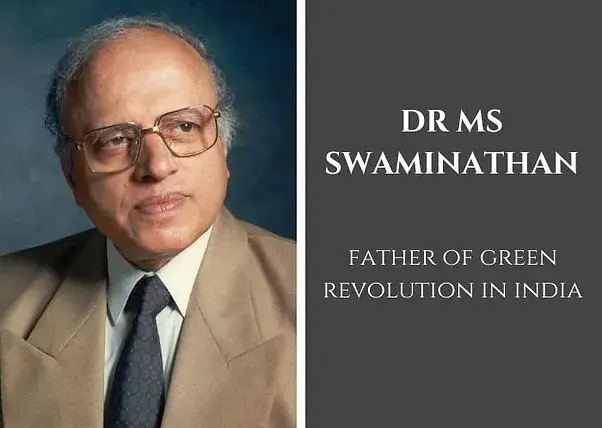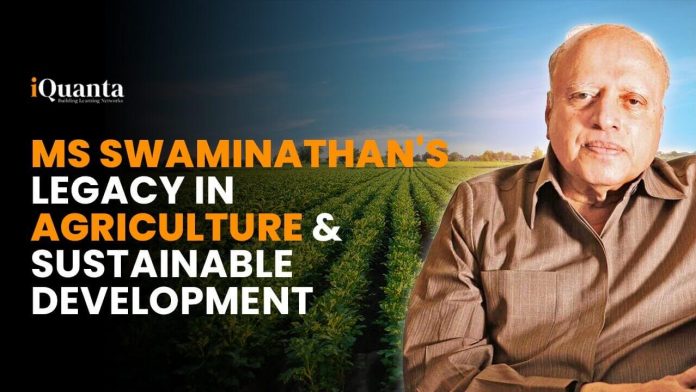Genre : Current Affairs
On a somber day, India and the world mourn the loss of a true visionary, Professor Monkombu Sambasivan Swaminathan, fondly known as MS Swaminathan. With his passing at the age of 98, we reflect on the remarkable life and contributions of the Father of India’s Green Revolution. Professor Swaminathan, a celebrated scientist and agricultural icon, breathed his last at his residence in Chennai on 28th September 2023 at around 11:20 am. His enduring legacy in agriculture and sustainable development will forever be etched in our hearts and history.

Architect of Agricultural Revolution
The 1960s were a tumultuous period in India’s history, marked by food scarcity and a looming famine. It was during this challenging era that MS Swaminathan emerged as a beacon of hope. With strategic policies and the development of high-yielding seed varieties tailored to India’s diverse climate, he initiated a social and agricultural revolution at the grassroots level, effectively addressing the issue of food scarcity.
Professor Swaminathan’s leadership roles played a pivotal role in shaping India’s agricultural landscape. He served as the Director of the Indian Agricultural Research Institute from 1961 to 1972. Following this, he assumed roles as Director General at the Indian Council of Agricultural Research (ICAR) and Secretary to the Government of India at the Department of Agricultural Research and Education from 1972 to 1979. His contributions further extended to serving as the Principal Secretary in the Ministry of Agriculture between 1979 and 1980.
Global Impact and Recognition

MS Swaminathan’s influence transcended India’s borders, making him a revered figure on the global stage. From 1980 to 1982, he served as the Acting Deputy Chairman and later as a Member (Science and Agriculture) of the Planning Commission. His international assignments included the role of Director General at the International Rice Research Institute in the Philippines from 1982 to 1988, an institution funded by the Rockefeller Foundation.
In 1987, he received the inaugural World Food Prize, a monumental recognition of his tireless dedication to advancing agriculture and food security. Notably, he used the $200,000 prize money to establish the MS Swaminathan Research Foundation (MSSRF) in Chennai’s Taramani, further cementing his commitment to agricultural advancement.
Praise from Global Leaders
Javier Pérez de Cuéllar, the former United Nations Secretary-General, hailed Swaminathan as “a living legend who will go down in history as a world scientist of rare distinction.” Former US President Ronald Reagan also acknowledged the transformative impact of Swaminathan’s efforts, recognizing his pivotal role in improving global food supply.
Advocating for Farmers’ Welfare
In 2004, Swaminathan was appointed as the chair of the National Commission on Farmers, a critical initiative aimed at addressing farmer distress and the alarming rise in suicide cases across India. His multifaceted contributions earned him a place on Time magazine’s list of the 20 most influential people in 20th-century Asia.
A Legacy of Empowerment
Dr. Soumya Swaminathan, Swaminathan’s daughter and former Deputy Director-General of the World Health Organization, shared insights into her father’s commitment. She revealed that he had been unwell for the past few days but remained dedicated to farmers’ welfare and uplifting the marginalized. Dr. Soumya Swaminathan also acknowledged her father’s advocacy for women in Indian agriculture, citing initiatives like the Mahila Sashaktikaran Yojana aimed at supporting women farmers.
Swaminathan’s vision extended to the inclusion of gender and environmental perspectives during his tenure at the Sixth Planning Commission, reinforcing his commitment to holistic agricultural development.
Condolences Pour In
On September 28, Prime Minister Narendra Modi expressed his condolences on social media, praising Swaminathan’s groundbreaking work in agriculture, which transformed millions of lives and secured food security for the nation.
President of India, Droupadi Murmu, acknowledged Swaminathan’s vital role in ensuring food security and self-reliance in food grains. She hailed him as the Father of the Green Revolution, a title that resonates with the hearts of many.
Former President of India, M Venkaiah Naidu, fondly remembered his interactions with the eminent scientist and recognized Swaminathan’s pioneering contributions.
Kerala Chief Minister Pinarayi Vijayan lauded Swaminathan as a visionary and pioneer in agriculture and sustainable development. He emphasized Swaminathan’s tireless efforts to enhance food security and improve the lives of farmers.
Congress leader Rahul Gandhi paid tribute to Dr. MS Swaminathan, highlighting his instrumental role in revolutionizing India’s agriculture and securing the nation’s food surplus status.
Union Minister Nitin Gadkari acknowledged Swaminathan’s lifelong dedication to advancing agriculture and improving food security.
Commerce Minister Piyush Goyal celebrated the Padma awardee for his “relentless efforts in the field of agriculture guided the nation towards achieving food security” while condoling his demise.
Swaminathan is survived by his wife, Shrimati Mina, and three daughters: Dr. Soumya Swaminathan, chairwoman of the MS Swaminathan Research Foundation; Madhura Swaminathan, a professor of economics at the Indian Statistical Institute in Bangalore; and Nitya Rao, a professor in gender and development at the University of East Anglia in England.
In the wake of MS Swaminathan’s passing, India and the world remember a visionary scientist whose enduring legacy will continue to inspire generations and drive agricultural progress.
The Green Revolution: Transforming India’s Agricultural Landscape
The term “Green Revolution” resonates strongly with India’s agricultural history, and at the heart of this transformative movement was Professor MS Swaminathan. The Green Revolution, which began in the 1960s, was a pivotal period that forever changed the face of Indian agriculture. Professor Swaminathan played a central role in orchestrating this agricultural revolution, leaving an indelible mark on the nation’s food security.
Background of the Green Revolution
In the early 1960s, India faced a severe food crisis. The country struggled with inadequate agricultural practices and technologies, leading to recurring famines and food shortages. At that critical juncture, MS Swaminathan, armed with his deep knowledge of agriculture and a visionary outlook, stepped forward to address this pressing issue.
MS Swaminathan’s Vision
Professor Swaminathan’s vision for the Green Revolution was to usher in a new era of agriculture characterized by increased crop yields, improved crop varieties, and enhanced food production. He understood the importance of developing high-yielding seed varieties that were adapted to India’s diverse agro-climatic conditions. His pioneering efforts in crop breeding and genetics led to the creation of new wheat and rice varieties, often referred to as “miracle seeds,” which significantly boosted crop yields.
The Impact of the Green Revolution
The impact of the Green Revolution was profound and far-reaching. It resulted in a remarkable increase in food production, particularly in staple crops like wheat and rice. India transitioned from a food-deficit nation to achieving self-sufficiency in food production. The increased agricultural productivity not only ensured food security but also had significant socio-economic implications.
Farmers, who had previously struggled with low yields and food shortages, now had access to improved crop varieties and modern farming techniques. This transformation uplifted millions of rural households, reducing poverty and enhancing their standard of living. The Green Revolution also played a pivotal role in stabilizing food prices and mitigating the risk of famines.
Challenges and Criticisms
While the Green Revolution brought about substantial benefits, it also faced challenges and criticisms. Some critics pointed out that the focus on high-yielding varieties led to the neglect of traditional crop diversity, resulting in genetic uniformity and vulnerability to pests and diseases. Additionally, the increased use of chemical fertilizers and pesticides raised concerns about environmental sustainability and long-term soil health.
MS Swaminathan’s Sustainable Agriculture Approach
It’s important to note that MS Swaminathan was not only an advocate of increased agricultural productivity but also a proponent of sustainable and environmentally responsible farming practices. He recognized the need to balance productivity with ecological considerations. Throughout his career, he emphasized the importance of preserving biodiversity, conserving natural resources, and promoting organic farming methods.
Swaminathan’s commitment to sustainable agriculture was exemplified in his initiatives and research. He championed the concept of “Evergreen Revolution,” which aimed to combine the benefits of the Green Revolution with ecological sustainability. This approach emphasized the importance of diversifying crops, promoting organic farming, and conserving water resources.
Legacy and Future Challenges
The Green Revolution, spearheaded by Professor MS Swaminathan, remains a watershed moment in India’s agricultural history. It not only addressed immediate food security concerns but also laid the foundation for the country’s agricultural growth. However, as India continues to grapple with evolving challenges in agriculture, including climate change, resource depletion, and the need for sustainable practices, Swaminathan’s legacy serves as a guiding light.
Today, the agricultural landscape is undergoing a transformation once again, driven by technology, innovation, and the imperative to achieve not only higher yields but also sustainable and environmentally responsible farming. As India navigates these challenges, the principles and values espoused by MS Swaminathan continue to influence agricultural policies and practices.
Conclusion
In the passing of MS Swaminathan, India and the world have lost a visionary scientist, a champion of sustainable agriculture, and a beacon of hope for millions of farmers. His contributions to the Green Revolution and his enduring commitment to farmers’ welfare and ecological sustainability have left an indelible mark. As we reflect on his remarkable journey, we are reminded of the profound impact that one individual can have on a nation’s destiny. Professor Swaminathan’s legacy will continue to inspire future generations to innovate, advocate for sustainable agriculture, and work towards a hunger-free world.
If any of the exams you’re preparing for concerns General Awareness (MBA, UPSC, GDPI, etc.), you can go for iQuanta’s GK Course.





